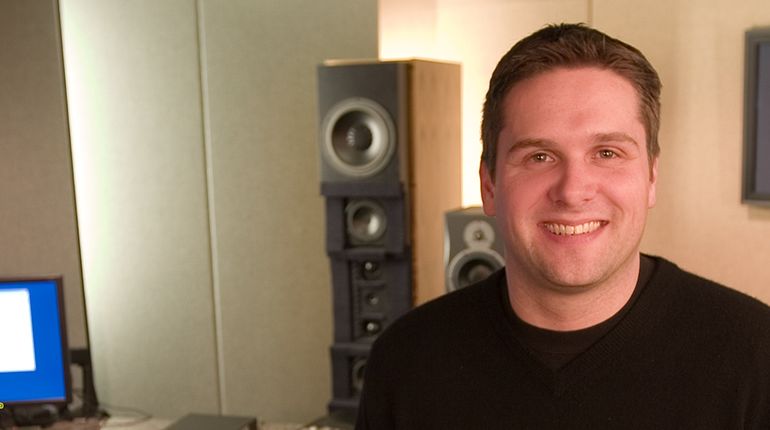
Adam Ayan
Adam Ayan discusses Bob Ludwig's mentorship, the industry's "loudness wars," the use of hardware vs. software, and the discoveries he made using Ozone and RX.
Dizzy Gillespie once said, "It's taken me all my life to learn what not to play," and the same could easily be said of mastering. To be able to take a fully mixed album and actually make it sound better, sometimes using only the sparest of techniques, is a subtle, sensitive and even subjective art. In essence, though, it's the key to what makes a good mastering engineer. When you can deliver those results consistently, to the point where you've gained the unwavering trust of the artists you work with…well, then you're operating on another level entirely.
Adam Ayan certainly knows what it feels like to breathe that rarified air. With multiple GRAMMY-winning and platinum-selling projects to his credit, Ayan is widely acknowledged as having some of the most trusted ears in the music business. He has logged more than ten years in his own mastering studio at Bob Ludwig's Gateway Mastering & DVD in Portland, Maine, and has worked across all musical genres, with everyone from Madonna, the Foo Fighters and Rufus Wainwright to Carrie Underwood, Keith Urban and Coldplay. What's more, during his early years at Gateway, Ayan got "an Ivy League education" in all the arcane tricks of the mastering trade from Ludwig himself, whose own list of credits (Zeppelin, Springsteen, et al) reads like a who's who of the Rock and Roll Hall of Fame.
These days, mentor and student get a mutual kick out of sharing their studio experiences, and continue to flourish while the rest of the music industry–major labels in particular–wrestles with the ever-shifting economics of digital distribution, streaming and file-sharing. Undeniably, independent artists have reaped some of the benefits of the new paradigm, even as production budgets have shrunk. But after all the shakeouts and adjustments (including the emergence of cheaper technology, which has made it easier to make and sell an album than ever before), the reality is that experienced mastering engineers are still in demand. In the end, that says everything about what's important to an artist: you can write the greatest songs in the world, but how they sound is equally vital to how your message gets across.
"That's one thing that's been good for us here at Gateway," Ayan says. "When all these budget issues started coming up, I felt like our clients were relying on us even more. Maybe they weren't able to work at the studio they wanted, or they might not have been able to hire the mix engineer they wanted–you know, any one of a number of different variables. But at the very least, they could make sure that the overall mastering picture was taken care of. So it's really been an interesting time for us in the record business."
Can you elaborate further on how the industry, and your customer, has changed during your career at Gateway? Have changes in mastering technology affected your outlook on using software versus hardware?
I've been working in the industry for over 16 years now, and it's changed quite a bit. We're down to just a few major record labels, and a lot of the indies have closed, so more artists are making records on their own. That can feel discouraging at times for our industry, but it's also very empowering and exciting to see where it's going. I've always been a champion of the artist, and now more than ever, they're closer to their art and in control of their own destiny.
On the technical side, the tools just keep getting better. When I started out, digital was good, but now it's fantastic. DAWs and plug-ins have become really powerful and sound amazing. They've also improved workflow, and ultimately our creativity. Now I'm able to master a mix and shape it in a way that wasn't possible when I started out, because I can really dig in and use the tools to make the music sound that much better.
I use a combination of hardware, both analog and digital, and software on virtually every mastering session. Every tool has its appropriate application, and each one is another color in my mastering palette. Combining hardware and software in a hybrid signal path allows me to use all my tools to their fullest potential, and it gives me a lot of options for shaping a mix. I honestly don't feel the notion that "hardware is better than software" exists anymore.
"I tell all my clients that my philosophy is to master their record so that it's competitive in terms of level, but without the diminishing returns."
What would you say to encourage anyone who is trying to do their own mastering at home?
Listen to as many great recordings as you can, because it helps you learn what a good record sounds like in your listening environment. It seems like a simple concept, but it really shouldn't be undervalued. You have to develop your ears for subtlety and nuance, and it doesn't happen overnight. I think it's worth spending much more time focusing on this skill, rather than building up your gear or acquiring plug-ins.
"Listen to as many great recordings as you can, because it helps you learn what a good record sounds like in your listening environment."
What are some of your own personal choices–either records you've done, or classics–that you use as references?
Early on, there were a few records that were really important for me. I don't know if you'd call this a classic, in terms of what you'd hear on classic rock radio, but the Foo Fighters' The Colour and the Shape is still a favorite of mine. That was one that Bob had done—that and Sheryl Crow's self-titled album. Madonna's Erotica is another one because the bass response is amazing–that's a great Pop reference. I also used Garbage's Version 2.0 early in my career to tune my ears. Shirley Manson gives a really dynamic performance throughout that record, and overall it just sat well with me, production-wise, with a great bass response.
For my own projects, a great reference for me is the Rascal Flatts album Me and My Gang . The first few cuts specifically–even now, if I'm gonna go check out a new set of speakers, that would be one of the first records I go to. Sarah McLachlan's Laws of Illusion is another one I've just done that I reference quite often; Carrie Underwood's last two as well. Augustana's last record too—I give them spins at home and in the car all the time, and not just for the sonics; the songs themselves are really well done.
Are there common mistakes that a fledgling mastering engineer might make, and do you have any advice on how to avoid those pitfalls?
I recently did a talk at SXSW [in Austin] and the AES Convention in NYC that I called "Why Mastering Is More Than Just Loud.” Mastering is about much more than just pushing a mix through some limiters for level. I think a lot of new engineers get way too caught up in getting level. There's an art to it that comes with experience, and it's best done in tandem with shaping a mix tonally [with EQ]. I'd like to see more fledgling engineers focus first on getting the EQ curve right, and then on getting the level. Unfortunately, I think it's all backwards for most people starting out today.
Since you mention the so-called "loudness wars," where compression and clipping have crept into how music is mastered—how have you worked around that trend?
Most artists want their records loud, and expect that they'll be as loud as any other release that's comparable to theirs. I work really hard at getting good healthy levels, but with as much musicality as possible. I tell all my clients that my philosophy is to master their record so that it's competitive in terms of level, but without the diminishing returns. Every mix has a sweet spot in terms of loudness, and once you get out of that, you quickly get distortion, lack of clarity, lack of bass, and of course lack of dynamics. My challenge is to get the kind of level my clients expect, but to do it as musically as possible, without leaving that sweet spot.
For me, the bass frequency–bass guitar and kick drum, especially in pop music–are super-important. I started out in music as a bass player, so the bass and the rhythm section mean a lot to me. And it's just not possible to have a ton of level and have good bass response. You don't hear a lot of people talk about that in the context of the loudness wars, but I find that the more you push it, the less likely it is that you can keep the bottom end rich and big and punchy. When you listen to some of those records that are criticized as being insanely loud—I'm talking about examples of really bad loud—they all sound surprisingly small. They're shallow in the bottom end, and they're all upper midrange.
The funny thing is that what's acceptable in terms of level is really subjective. What I might consider unacceptable might even be what someone else has grown to expect in a record. This is what's wrong with the loudness wars. As an industry, we've been willing to sacrifice musicality and good sonics for level, and now that the cat's out of the bag, it's really hard to go back. The good news is that most of my clients want to get back to dynamic-sounding records again. I get fewer calls asking me to "make it louder."
"I really like RX Advanced. I've used it to remove the odd noise that my other de-clickers just never in a million years would remove."
I would think it's an especially sensitive issue with some of the remastering projects you've done, like the Rolling Stones, Rush, Counting Crows, etc.
With remastering, I generally don't like to go crazy with level. These records have been known and loved by millions, and shouldn't be victims of hyper-compression. I can almost always get more level on a remaster versus the original without the artifacts of compression and limiting—that's because most modern digital compressors and limiters are so much more transparent than what might have been available the first time around. Like any other mastering session, if I reach that point of diminishing returns, I stop and back off.
Has Bob Ludwig revealed any mastering secrets that you can tell us about? How has working with him influenced your own approach?
I was Bob's assistant for my first few years at Gateway, and I was fortunate enough to be one of the few mastering engineers that he shared his secrets and mastering technique with. The mentor/assistant relationship is an invaluable learning experience that many of the latest generation of engineers are missing out on. Being Bob's assistant was like getting an Ivy League education in mastering. Nowadays Bob and I are busy with our own sessions, but we still get to share experiences, knowledge and tricks pretty often. That's great for both of us.
Of course I've also developed my own style and mastering secrets over the last 12-plus years. That said, I can't share them! What I can say is that the real secret to mastering is to hone your listening skills. What I do is never about one particular piece of gear or preset or secret sauce. It's really all about having the aptitude for listening to a mix and knowing how to bring it to its fullest sonic potential. That means having the ears and the imagination, as well as the technical aptitude to make it all happen. There isn't one secret that makes all that.
You've also worked on quite a few GRAMMY-nominated, and GRAMMY-winning, country albums. Modern country music in particular seems to be strongly artist-driven and really depends on the vocal character of the individual singer and how that comes across in the music. How do you approach mastering for vocals on projects like these—or do you adjust your general approach at all?
That's a great question. Every genre of music, and in a lot of cases even the tastes of individual artists and record producers, requires a certain approach and sensitivity to what's best for the music, the artist, and for that particular market. Modern country records do have a keen focus on the vocal, and often I find that the vocal is meant to be slightly louder than most rock records. In that case, I'm sensitive to the vocal level and tonality, and I make sure not to do anything that will affect it negatively. If I'm given a mix for a genre where the vocal is lower than what I think is right, I might go for a "vocal up" mix if it exists, or I'll finesse the mix to better feature the vocalist.
I'm not dodging the question, but mastering is just as much about knowing what not to do, which is a secret in itself. That said, I do like to use stereo widening sometimes because it helps set up the soundstage in stereo. But I use it very judiciously. Just to give you an example, I've done a few records for Carrie Underwood, and her vocals are always amazing, and I don't want to take anything away from her mixes. When I got them for her new album, the vocals were damn near perfect in the mix. So with her records, I'm always very careful about stereo widening, either very minimal or none at all, because her voice is already so perfectly set in the mix. I never want to take away from it; I only want to enhance it.
You mentioned that you've folded software into your mastering setup. What appeals to you most about Ozone? Do you have any favorite Ozone modules and features?
My favorite Ozone module is the Maximizer. And in terms of functionality, I love the fact that the various modules have been separated for individual use in Ozone Advanced. I generally find that my favorite tools have the least amount of variables, and breaking the modules out separately just makes using the tool that much easier.
I use a bunch of different limiters, and they all have a place in terms of what they work well for on any given recording. The Maximizer is another flavor for me because the intelligent algorithms do a really nice job of getting level fairly transparently, without adding artifacts. And in some cases, I find that depending on how I use it, I can get some edge and color that's beneficial to a particular recording or song. Even going back to Ozone 4, I've been pretty impressed with how the Maximizer sounds.
Have you tried any of the other iZotope products?
I really like RX Advanced. I've used it to remove the odd noise that my other de-clickers just never in a million years would remove. I haven't had to use it in a major overhaul for any one thing specifically, and it's one of many restoration tools that I have. But when I first tried it out, I was really impressed with how well it does removing ticks and pops, and even more so with the algorithm for removing things with a spectral analyzer. Spectral Repair does a pretty amazing job of giving you a visual representation of what's happening sonically, and if you need to remove an organic type of noise, like a chair squeak or some other movement that a musician makes in the room, you can get rid of it pretty easily.
With all the changes in the music industry going forward, do you feel that artists will continue to recognize that it's not such a bad thing to involve professionals in their production process?
I was just talking to a record producer about this recently. I think a fair amount of indie artists are getting over the fact now that they can do everything in their basement or bedroom. They're realizing the benefit of working with a professional when they can. And don't get me wrong—I know a lot of musicians who have done a great job of it; like I said, that can be very empowering and exciting. But it's very hard to be the artist, the songwriter, and the producer, and the engineer, and an objective voice in making the record. It's just incredibly difficult to wear all those hats. For a while, I think economics dictated that a lot of artists had to do that, and I think there was a cool "newness" factor to it, but now a fair amount have realized there's a reason for working with other professionals. We can work together and it becomes a real collaboration. As an artist, you don't have to worry about mic placement and all the other technical things. You can just focus on making your music.


